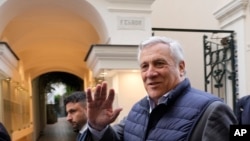The United States warned China on Wednesday against helping Russia in its war on Ukraine and said it is "prepared to take further steps as necessary." In Italy, foreign ministers from the Group of Seven leading industrialized nations gathered to reaffirm their support for Ukraine's defense.
"We believe that the PRC is supporting Russia's war effort and is doing so by helping ramp up its defense production," State Department principal deputy spokesperson Vedant Patel told reporters during a briefing in Washington.
"Specifically," he said, "the PRC is providing Russia with significant quantities of machine tools, microelectronics, optics, UAVs [unmanned aerial vehicles, or drones] and cruise missile technology, and nitrocellulose, which Russia uses to make propellants for weapons."
Patel said the United States believes these materials "are filling critical gaps in Russia's defense production cycle" and helping to revitalize Russia's defense industrial base.
"China's support is actively enabling Russia's war in Ukraine, and it poses a significant threat to European security," he added. "We've sanctioned relevant firms in the PRC and are prepared to take further steps as necessary."
Blinken, G7 leaders talk
In Capri, Italy, U.S. Secretary of State Antony Blinken is holding talks this week with foreign ministers from the other G7 countries — Canada, France, Germany, Italy, Japan and the United Kingdom — as well as representatives from the European Union. Topics include Ukraine support, the Middle East crisis, Haitian instability and global partnerships.
German Foreign Minister Annalena Baerbock on Wednesday said the G7 ministers would discuss how to get more air defense to Ukraine as Kyiv faces increasing pressure from Russia.
"We and our partners around the world must now be just as resolute in our defense against Russian terror from the air," Baerbock said in a statement.
Blinken will later visit China, where he is expected to bring up Washington's concerns about China's support for Russia's defense industrial base.
On the margins of the G7 meeting Wednesday, Blinken and Italian Foreign Minister Antonio Tajani signed a memorandum of understanding to counter the manipulation of information by other countries.
Blinken said the two nations are collaborating on "all of the most critical issues," including aiding Ukraine in defending itself against Russian aggression, addressing challenges in the Middle East and sharing approaches to challenges posed by China.
Beijing rejected what Chinese officials described as Washington's "smear."
"China regulates the export of dual-use articles in accordance with laws and regulations. Relevant countries should not smear or attack the normal relations between China and Russia and should not harm the legitimate rights and interests of China and Chinese companies," Mao Ning, a spokeswoman for China's Ministry of Foreign Affairs, said during a briefing.
China continues supporting Russia
After Russian Foreign Minister Sergey Lavrov's visit to Beijing last week, Chinese officials said China would "continue to support Russia in pursuing development and revitalization under the leadership of President Vladimir Putin."
They said the two nations "have committed themselves to lasting friendship" and a deepened comprehensive strategic partnership.
Russian missile kills at least 17
In Washington, U.S. Secretary of Commerce Gina Raimondo met with Ukrainian Prime Minister Denys Shmyhal. The two discussed the U.S. Commerce Department's work with partners to coordinate export controls and restrict sales of advanced technologies to Russia.
Deputy U.S. Treasury Secretary Wally Adeyemo said G7 finance leaders have been working toward a plan to unlock the value of frozen Russian sovereign assets to aid Ukraine in the near term. But he noted the talks are still a work in progress.
In Ukraine, officials said earlier Wednesday that a Russian missile attack hit the northern city of Chernihiv, killing at least 17 people and injuring 61 others.
Denise Brown, the U.N. humanitarian coordinator in Ukraine, condemned the latest wave of strikes. She also emphasized that under international humanitarian law, civilians and hospitals must be protected.
In Chernihiv, aid workers provided on-the-ground support to those affected by the strikes, including psychosocial and legal assistance. Their efforts complement the work of first responders and rescue services.
Some information for this report came from Reuters.

